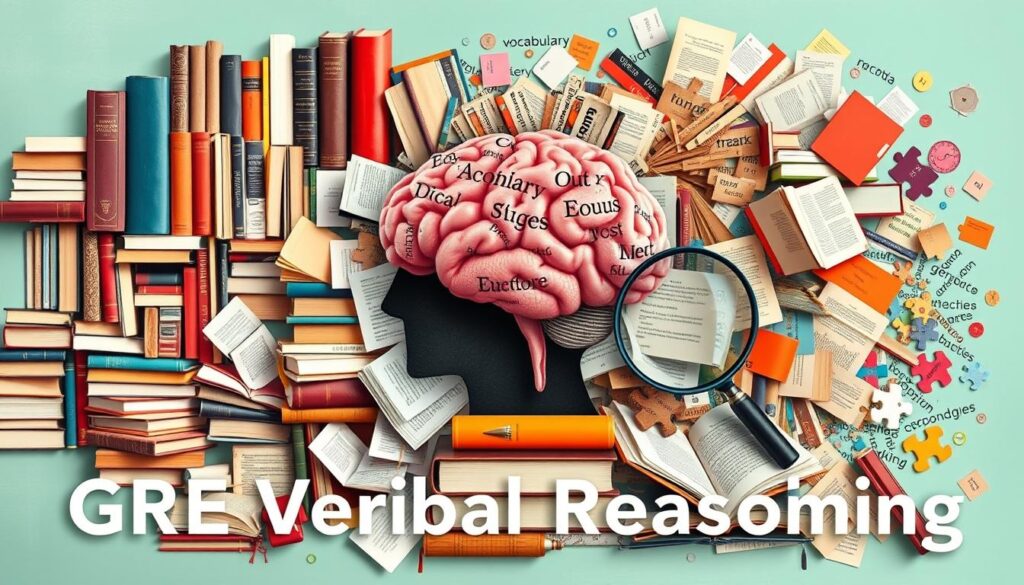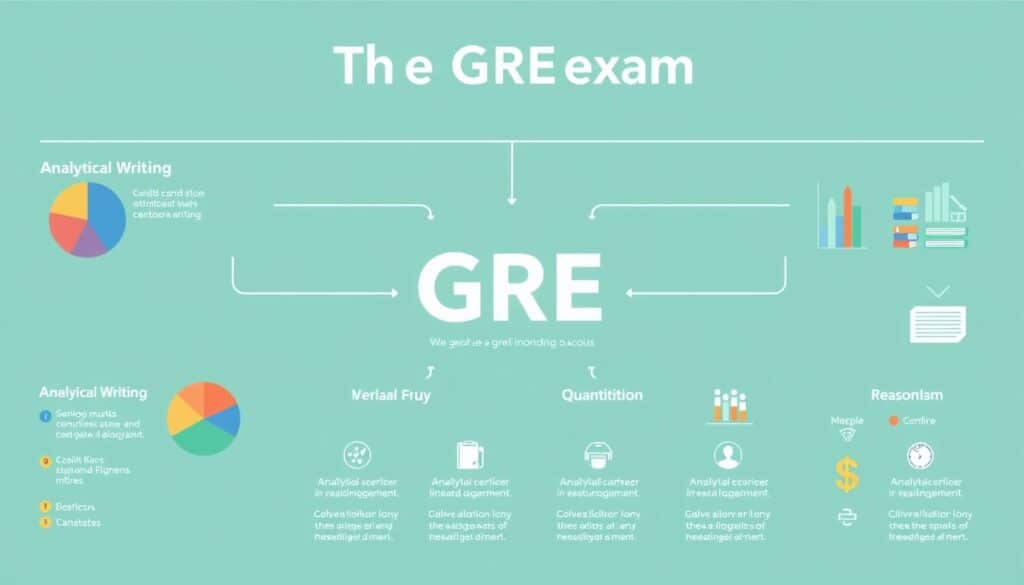The Graduate Record Examination (GRE) tests your skills in verbal and quantitative reasoning, critical thinking, and analytical writing. It checks if you’re ready for graduate studies in many fields. Knowing what the GRE covers is key to making a good study plan and aiming for a high score GRE Syllabus.
Key Takeaways
- The GRE General Test assesses verbal reasoning, quantitative reasoning, and analytical writing skills.
- The Verbal Reasoning section evaluates your ability to analyze and interpret written material, understand relationships between ideas and words, and draw logical conclusions.
- The Quantitative Reasoning section measures your ability to solve mathematical problems, interpret data, and apply quantitative concepts.
- The Analytical Writing section assesses your capacity to articulate complex ideas, support your claims with relevant evidence, and maintain a well-focused, coherent discussion.
- The GRE also offers Subject Tests in specific disciplines, such as Mathematics, Physics, and Psychology, to evaluate your expertise in those fields.
Introduction to the GRE Exam
The GRE (Graduate Record Examination) is a test used by graduate schools worldwide. It has two formats: the GRE General Test and the GRE Subject Test. The GRE General Test is a computer test that checks your verbal, quantitative, critical thinking, and analytical writing skills. It’s key for getting into a postgraduate program abroad.
The GRE Subject Test, however, tests your knowledge in areas like Mathematics, Physics, and Psychology. Each test has its own syllabus and content, tailored to different graduate programs.
The GRE General Test lets you move forward and backward, review answers, and change them in each section. It’s section-level adaptive, with the second section’s difficulty based on the first. There’s also an unscored section for research and a research section at the end.
Starting September 22, 2023, the GRE General Test will have one section for Analytical Writing, two for Verbal Reasoning, and two for Quantitative Reasoning. Before, it had one section for Analytical Writing, two for Verbal Reasoning, and two for Quantitative Reasoning.
The test aims to measure various skills, like analyzing and drawing conclusions, understanding words and texts, and basic math. The Analytical Writing section focuses on critical thinking, complex ideas, and supporting arguments.
In summary, the GRE exam helps graduate schools assess candidates’ qualifications and potential. It ensures they’re ready for postgraduate studies.
GRE Syllabus for Verbal Reasoning

The Verbal Reasoning section of the GRE syllabus is key. It tests how well you can understand and make sense of texts. You’ll learn to spot important points and see the big picture from what’s given.
This part of the GRE looks at your ability to grasp word meanings and connections. It also checks if you can pick out the main ideas and understand the author’s point of view.
Reading Comprehension
The Reading Comprehension part of the GRE Verbal Reasoning section focuses on your text analysis skills. You’ll need to find the main idea, spot supporting details, and understand the author’s view. It also tests your ability to draw logical conclusions from the information given.
Sentence Equivalence
The Sentence Equivalence part of the GRE Verbal Reasoning syllabus is about finding the right words to complete a sentence. It checks your vocabulary and how well you understand word relationships.
Text Completion
The Text Completion section of the GRE Verbal Reasoning syllabus is about filling in the blanks to make a complete text. It evaluates your vocabulary and comprehension of words, sentences, and texts.
Mastering these parts of the GRE Verbal Reasoning section shows you’re good at critical thinking and language skills. These are key for doing well in graduate school and beyond.
GRE Syllabus for Quantitative Reasoning

The Quantitative Reasoning section of the GRE exam tests your skills in understanding and solving math problems. It covers basic math concepts like arithmetic, algebra, geometry, and data analysis. You’ll have an on-screen calculator to help with these problems.
This section has 27 questions and takes 47 minutes to complete. It focuses on high school-level math, especially algebra and statistics. You won’t need trigonometry or calculus. The test assumes figures are not scaled and all numbers are real.
The Quantitative Reasoning section covers various topics, including:
- Arithmetic: Integers, exponents, estimation, percent, ratio, and sequences
- Algebra: Operations with exponents, factoring, various equations, coordinate geometry, and function graphs
- Geometry: Parallel lines, circles, triangles, polygons, congruent figures, 3-dimensional shapes, area, and volume
- Data Analysis: Descriptive statistics, interpretation of data in tables/graphs, basic probability, counting methods, and normal distributions
There are different question types in this section. You’ll see Quantitative Comparison, Multiple-choice, and Numeric Entry questions. Data Interpretation sets also present questions based on given data.
| GRE Quantitative Reasoning Section | Duration | Number of Questions |
|---|---|---|
| Quantitative Reasoning | 47 minutes | 27 |
To do well, get to know the answer choices and avoid complex calculations. Learn when to use shortcuts or simplification strategies.
“The Quantitative Reasoning section of the GRE exam is designed to assess a candidate’s ability to understand and analyze quantitative information, as well as their problem-solving skills using mathematical models.”
GRE Syllabus for Analytical Writing

The Analytical Writing section of the GRE is key. It tests your critical thinking and writing skills. You need to share complex ideas clearly and support your arguments well.
This section has a 30-minute “Analyze an Issue” task. You must evaluate an issue, think about its complexities, and argue with reasons and examples. The typing tool allows you to insert, delete, cut-and-paste, and undo text. But, it doesn’t have spellcheckers or grammar checkers.
The tasks cover many subjects but don’t need specific knowledge. The GRE Program has a PDF to help you prepare. Make sure to use the 30 minutes wisely to plan and write your essay.
“The Analytical Writing section of the GRE is designed to measure your critical thinking and analytical writing skills, which are essential for success in graduate and business school,” says Dr. Emily Johnson, an educational consultant.
The GRE Analytical Writing skills are vital for graduate and professional programs. They show you can articulate ideas, support arguments, and have a coherent discussion in standard written English.
GRE Subject Test Syllabus
The Educational Testing Service (ETS) offers GRE Subject Tests for specific fields. These tests check if you know a lot about your chosen field. They focus on topics you learned in college.
Mathematics Test
The GRE Mathematics Subject Test tests your math skills. It covers Calculus (50%), Algebra (25%), and Additional Topics (25%). You’ll face about 66 questions in 2 hours and 50 minutes.
Physics Test
The GRE Physics Subject Test checks your physics knowledge. It includes topics like Classical Mechanics, Electromagnetism, Optics and Wave Phenomena, Thermodynamics and Statistical Mechanics, Quantum Mechanics, Atomic Physics, Special Relativity, and Laboratory Methods. You’ll answer about 70 questions in 2 hours.
Psychology Test
The GRE Psychology Subject Test tests your psychology knowledge. It covers Biological, Cognitive, Social, Developmental, and Clinical Psychology, as well as Measurement, Methodology, and other specialized areas. You’ll answer about 144 questions in 2 hours.
These GRE Subject Tests let you show off your field-specific knowledge. This can help you get into top graduate programs.
GRE Syllabus and Test Format

The GRE General Test is a computer-delivered exam. It has five sections: Analytical Writing, Verbal Reasoning, and Quantitative Reasoning. The test lasts about 1 hour and 58 minutes.
The test starts with the Analytical Writing section. Then, it moves to Verbal Reasoning and Quantitative Reasoning in any order. Each Verbal Reasoning and Quantitative Reasoning section has 27 questions. Only these scores count towards your overall GRE score.
The 2024 GRE General Test has 55 questions in five sections. The Verbal Reasoning section has 27 questions, split into two parts. The Quantitative Reasoning section also has 27 questions, divided into two parts.
The Verbal Reasoning and Quantitative Reasoning sections adjust their difficulty. This means the questions get harder or easier based on how well you do.
The GRE Subject Tests in Mathematics, Physics, and Psychology will start in September 2023. These tests focus on specific subjects. They check your knowledge and skills in those areas.
Also Read : TOEFL Syllabus Insights: Tips For Success On The Exam
“The GRE® General Test syllabus underwent a major change in August 2011, removing antonyms and analogies from the Verbal Reasoning section.”
Conclusion
The GRE syllabus covers a wide range of skills and topics. This includes verbal and quantitative reasoning, analytical writing, and subject-specific knowledge. By understanding the syllabus and test format, students can prepare well for the exam.
This preparation helps them show their abilities to succeed in graduate school. Whether it’s the GRE General Test or Subject Tests, students can improve their skills. This is a big step towards their postgraduate education goals.
The GRE exam tests critical thinking, vocabulary, and problem-solving skills. Knowing the syllabus and test format well helps students create a good study plan. They can then improve their exam skills and get the score they need for graduate school.
By mastering the GRE syllabus and using smart test-taking strategies, students can show their academic strength. This increases their chances of getting into top graduate programs. The GRE exam is a key step for students looking to advance their education and open new doors in their fields.
FAQs
Q: What is included in the GRE syllabus 2024?
A: The GRE syllabus 2024 includes sections on verbal reasoning, quantitative reasoning, and analytical writing. Each section covers specific topics and skills that test takers need to master to perform well on the GRE exam.
Q: What is the exam pattern for the GRE?
A: The GRE exam pattern consists of three main sections: Analytical Writing, Verbal Reasoning, and Quantitative Reasoning. Each section is designed to evaluate different skills, and the test format can include a combination of multiple-choice questions and written tasks.
Q: How can I prepare for the GRE effectively?
A: To prepare for the GRE, it’s important to study the GRE exam syllabus thoroughly, practice with GRE prep materials, and take practice tests. Creating a study schedule and focusing on weak areas can also enhance your preparation.
Q: What topics are covered in the GRE quantitative reasoning syllabus?
A: The GRE quantitative reasoning syllabus includes topics such as arithmetic, algebra, geometry, and data analysis. Test takers should be familiar with quantitative concepts and be able to solve problems using these skills.
Q: What does the GRE analytical writing section evaluate?
A: The GRE analytical writing section evaluates your ability to think critically and communicate complex ideas effectively. You will be required to analyze an argument and write a coherent essay that demonstrates your reasoning and writing skills.
Q: Are there any specific GRE verbal syllabus components I should focus on?
A: Yes, the GRE verbal syllabus includes reading comprehension, text completion, and sentence equivalence. Test takers should practice understanding complex passages and enhancing their vocabulary to excel in this section.
Q: How does the GRE exam pattern differ from other standardized tests?
A: The GRE exam pattern differs in that it includes a unique analytical writing section, unlike many other standardized tests. Additionally, the GRE allows for flexibility in question order and includes both verbal and quantitative sections that assess a range of skills.
Q: What is the significance of the official GRE test score?
A: The official GRE test score is significant because it is used by many graduate schools to assess the readiness of applicants for advanced study. High scores in the GRE exam syllabus sections can enhance your chances of admission into competitive programs.
Q: Can I take the GRE as a general and subject test?
A: Yes, you can take the GRE as both a general test and a subject test. The general test evaluates broad skills in verbal reasoning, quantitative reasoning, and analytical writing, while subject tests assess knowledge in specific disciplines.
Source Links
- https://gre.blog.targettestprep.com/gre-exam-syllabus/
- https://prep.yocket.com/gre/syllabus
- https://www.ets.org/gre/score-users/about/general-test/content-structure.html
- https://www.ets.org/gre/test-takers/general-test/prepare/test-structure.html
- https://www.ets.org/gre/test-takers/general-test/prepare/content/verbal-reasoning.html
